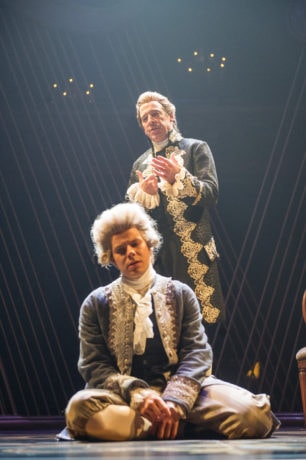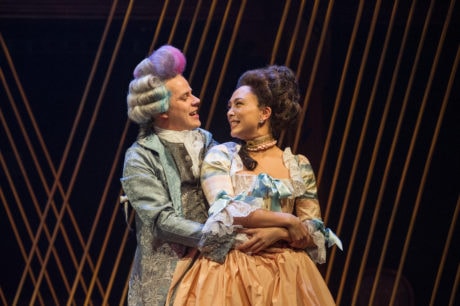What a great lively yarn about a musical disruptor as a stand-in for the volcanic eruptions of out-and-out revolution in the air throughout Europe and America. Amadeus at Folger Theatre is a triumph.

Amadeus is a charged, abundantly entertaining chronicle of generations at battle. The generations are represented by a fictionalized, brash “bad boy” of his times, Wolfgang Amadeus Mozart. He is out to scatter away those in his path with a musicalized refrain of what is best described as an “OK, Boomer” taunt. He finds notes to play that the older folk have a difficult time even hearing.
Mozart’s rapturous musical sneers are aimed at a fictionalized Antonio Salieri; an older, outwardly more rule-bound, but oh-so-crafty establishment composer. Salieri is a favorite of the creaky royal court of Austrian Emperor Joseph II. Let’s call him a self-aware sycophant, shall we?
Will God put a finger on the scales of one or the other in their battle for musical supremacy? Who will be standing by the road of music history?
Now don’t pick sides before you take your seat at the Folger. Remember, this is fiction and theater. Just let the highly rewarding, wired-up tale of Amadeus created by playwright Peter Shaffer and directed with an assured hand by Richard Clifford get inside you first. As Clifford suggests in his program notes, Amadeus is a trial, the audience to be jurors responding to this set-up: “This is now the very last hour of my life. You must understand me. Not forgive. I do not seek forgiveness.” What will the audience come to understand?
The two leads in Amadeus provide knockout portrayals. Ian Merrill Peakes (recently featured in DCMTA here) plays the older, staid Salieri. Peakes presents his Salieri as a prosperous man with fear and darkness hidden within. His Salieri is a formidable, assured, no-nonsense gentleman, yet he depicts internal self-aware fears in a number of fourth-wall-breaking conversations with the audience, as if the audience is sitting in on a therapy session with him. He says what he truly thinks in a most transparent manner. “Why does God only speak through Mozart’s music and not mine?” Salieri asks of himself and the audience.
Samuel Adams portrays Mozart as a frenetic rocket; an impulsive, perhaps bipolar, creative man looking to what could be, not what was. Adams’ Mozart is a younger man with enormous talents who wants to end the absolute power of the elites, the royals, and the church on what music is to be made and heard. But, getting in way of his success are his quirky giddy ways, his scatological language, his need for the constant high of attention, and his unmooring when those who have been his anchors are no longer available to help save him. Adams is in constant physical movement with a face that is ablaze with transparency, and his cocksure delivery of dialogue like this: “It’s the best opera yet written. That’s what it is. And only I could have done it. No one else living!”

The production is made modern and powerful by the portrayal of Mozart’s long-suffering wife Constanze. In that role, Lilli Hokama is no one-dimensional set-dressing. She quickly understands that there is wickedness in the world. She stands up to it. More so, as Amadeus moves toward its conclusion, Hokama takes on the central role as protector, not only of the man she married, but of his genius. The character of Constanze is no afterthought and her deus ex machina moment on stage lends truth to it.
John Taylor Phillips provides comic appeal in the role of Emperor Joseph II. He delivers a catchphrase of “well there you have it” that brings smiles of delight. A scene in which he gives his opinion performing as a straight man in a comedy duo with Mozart is worthy of streaming by the Folger to draw new audiences.
The fine ensemble adds to the strong production of Amadeus. Amanda Bailey and Louis Butelli play an often heard, two-person Greek Chorus of narrators named Venticello, alongside a bevy of privileged royal court partisans with plenty of snippy, snooty attitude. These include Justin Adams, Junior Gomez, James Joseph O’Neil, Yvonne Paretzky, Ned Read, Deidra LaWan Starnes, and Kathryn Zoerb.
One aural delight for the production is that it makes meaningful use of snippets of the recorded music of Mozart that woven into scene activity. There are bits and pieces of “The Marriage of Figaro,” “Don Giovanni,” “The Magic Flute,” and “Requiem.” Kudos to sound designer Sharath Patel.
Tony Cisek’s visually appealing set design includes representations of piano strings and the musical staff and a well-placed large religious cross. Light Design by Max Doolittle accentuates Cisek’s set.
Applause to the period costume design by Mariah Anzaldo Hale and to wardrobe head Cidney Forkpah and the wondrous wig design by Dori Beau Seigneur, wig builders Jamie Bagley and Lucy Wakeland, and wig mistress Daisy Howard. When you see the show you will come to understand these particular kudos.
Enjoy Amadeus as the fiction it is. It is a production about the hot furnace that is the creation of art. It could easily be about right now, as generations collide in the world of the creative arts, or technology or politics. To me it was. And as I write this, Mozart’s music floats through my room. What a genius.
Running Time: Approximately 3 hours including one 15-minute intermission.
Amadeus plays through December 22, 2019, at the Folger Theatre, 201 East Capitol Street SE, Washington, DC. For tickets, call the box office at (202) 544-7077, or purchase them online.




